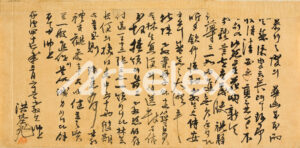Hong Gi-jo (1865 – 1938) was a Korean independence activist and a leader within the Cheondogyo movement.
During the Donghak Peasant Revolution in 1894, Hong led Donghak followers from the Gwanseo region in their uprising against the ruling authorities.
Later, on February 25, 1919, while in Gyeongseong (Seoul) for Cheondogyo-related matters, he was persuaded by Son Byeong-hui, Kwon Dong-jin, and Oh Se-chang to join the March 1st Movement as one of the 33 national representatives.
On February 27, he signed the draft of the Declaration of Independence, written by Choi Nam-seon, alongside the other Cheondogyo leaders.
On March 1, he participated in the reading of the Declaration at the Taehwagwan restaurant, after which he was arrested and sentenced to two years in prison.

